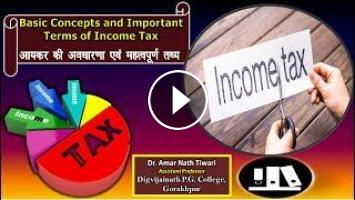Basic Concepts and Important Terms of Income Tax
Dr. Amar Nath Tiwari
Assistant Professor
Digvijainath P.G. College, Gorakhpur
Introduction of Income Tax - https://youtu.be/Vno4sCROAfM
Basic Concept of Income Tax
Income Tax is a direct tax levied by the Central Government of India upon the income earned during a previous year by a person according to prescribe rates in assessment year.
Income Tax Act, 1961
The Act contains provisions for –
(a) Determination of taxable income;
(b) Determination of tax liability;
(c) Procedure for assessment, appeals, penalties and prosecutions; and
(d) Powers and duties of Income tax authorities.
(i) Income Tax Act, 1961;
(ii) Income Tax Rules, 1962;
(iii) Finance Act (Annual);
(iv) Government Notifications;
(v) Circulars of Central Board of Direct Taxes;
(vi) Judicial Decisions
Basic Principles For Charging Income Tax
(i) Income of the previous year of a person is charged to tax in the immediately following assessment year.
(ii) Rate of tax is applicable as specified by the Annual Finance Act of that year.
(iii) In respect of income chargeable to tax, tax shall be deducted at source, or paid in advance (wherever applicable).
Important Terms of Income Tax Act, 1961
PREVIOUS YEAR [SEC.3]
Previous Year means the financial year immediately preceding the Assessment Year. Income earned in a year is assessed in the next year.
It is the year in which income earned is charged to tax.
FINANCIAL YEAR ACCORDING TO SEC. 2(21) of the General Clauses Act, 1897, a Financial Year means the year commencing on the 1st day of April.
Hence, it is a period of 12 months starting from 1st April and ending on 31st March of the next year.
Determination of the first previous year in case of a newly set-up business or profession or for a new source of income
EXCEPTIONS OF GENERAL RULE OF PREVIOUS YEAR
In this situation income of non-residents derived from carrying passengers, livestock or goods shipped at a port in India will be taxed @ 7.5 % of earning in the previous year. Only after making payment of such tax , ship will be allowed to leave the port.
2. Income of person leaving india :
3. Formation of aop or boi or an artificial person to fulfil specific aim:
4. Assessment of persons transferring property with a view to avoid tax
5. Discontinuing business or profession:
ASSESSMENT YEAR (A.Y.) [SEC. 2(9)]
Assessment year means the period of 12 months commencing on the 1st day of April every year.
It is the year (just after the previous year) in which income earned in the previous year is charged to tax.
PERSON [SEC. 2(31)]
Under section 2 (31) of Income Tax Act, 1961 following are included in the term ‘Person’:
(a) An Individual (Male or Female)
(b) A Hindu Undivided Family (HUF)
(c) A Company
(d) A Firm
(e) An Association of Person and A Body of Individuals or Co-operative Society
(f) A Local Body ( Municipality, District Board, etc.)
(g) Any Artificial Judicial Person ( Any God or Goddess)
(h) Any Artificial Person created by Law
ASSESSEE [SEC. 2(7)]
Under section 2 (31) of Income Tax Act, 1961 following are included in the term ‘Person’:
(a) A person who is liable to pay tax
(b) A person who is liable to pay any penalty and interest alongwith tax
(c) The person upon whom the proceedings of the assessment have been started.
(d) Deemed Assessee
(e) Assessee in Default
(f) The person in respect of whom assessment proceeding under this act had been started for the amount of refund due to him are any other person.
(g) The person in respect of whom assessment proceeding under this act had been started for fringe benefits.
Dr. Amar Nath Tiwari
Assistant Professor
Digvijainath P.G. College, Gorakhpur
Introduction of Income Tax - https://youtu.be/Vno4sCROAfM
Basic Concept of Income Tax
Income Tax is a direct tax levied by the Central Government of India upon the income earned during a previous year by a person according to prescribe rates in assessment year.
Income Tax Act, 1961
The Act contains provisions for –
(a) Determination of taxable income;
(b) Determination of tax liability;
(c) Procedure for assessment, appeals, penalties and prosecutions; and
(d) Powers and duties of Income tax authorities.
(i) Income Tax Act, 1961;
(ii) Income Tax Rules, 1962;
(iii) Finance Act (Annual);
(iv) Government Notifications;
(v) Circulars of Central Board of Direct Taxes;
(vi) Judicial Decisions
Basic Principles For Charging Income Tax
(i) Income of the previous year of a person is charged to tax in the immediately following assessment year.
(ii) Rate of tax is applicable as specified by the Annual Finance Act of that year.
(iii) In respect of income chargeable to tax, tax shall be deducted at source, or paid in advance (wherever applicable).
Important Terms of Income Tax Act, 1961
PREVIOUS YEAR [SEC.3]
Previous Year means the financial year immediately preceding the Assessment Year. Income earned in a year is assessed in the next year.
It is the year in which income earned is charged to tax.
FINANCIAL YEAR ACCORDING TO SEC. 2(21) of the General Clauses Act, 1897, a Financial Year means the year commencing on the 1st day of April.
Hence, it is a period of 12 months starting from 1st April and ending on 31st March of the next year.
Determination of the first previous year in case of a newly set-up business or profession or for a new source of income
EXCEPTIONS OF GENERAL RULE OF PREVIOUS YEAR
In this situation income of non-residents derived from carrying passengers, livestock or goods shipped at a port in India will be taxed @ 7.5 % of earning in the previous year. Only after making payment of such tax , ship will be allowed to leave the port.
2. Income of person leaving india :
3. Formation of aop or boi or an artificial person to fulfil specific aim:
4. Assessment of persons transferring property with a view to avoid tax
5. Discontinuing business or profession:
ASSESSMENT YEAR (A.Y.) [SEC. 2(9)]
Assessment year means the period of 12 months commencing on the 1st day of April every year.
It is the year (just after the previous year) in which income earned in the previous year is charged to tax.
PERSON [SEC. 2(31)]
Under section 2 (31) of Income Tax Act, 1961 following are included in the term ‘Person’:
(a) An Individual (Male or Female)
(b) A Hindu Undivided Family (HUF)
(c) A Company
(d) A Firm
(e) An Association of Person and A Body of Individuals or Co-operative Society
(f) A Local Body ( Municipality, District Board, etc.)
(g) Any Artificial Judicial Person ( Any God or Goddess)
(h) Any Artificial Person created by Law
ASSESSEE [SEC. 2(7)]
Under section 2 (31) of Income Tax Act, 1961 following are included in the term ‘Person’:
(a) A person who is liable to pay tax
(b) A person who is liable to pay any penalty and interest alongwith tax
(c) The person upon whom the proceedings of the assessment have been started.
(d) Deemed Assessee
(e) Assessee in Default
(f) The person in respect of whom assessment proceeding under this act had been started for the amount of refund due to him are any other person.
(g) The person in respect of whom assessment proceeding under this act had been started for fringe benefits.
- Catégories
- E commerce Formations















Commentaires